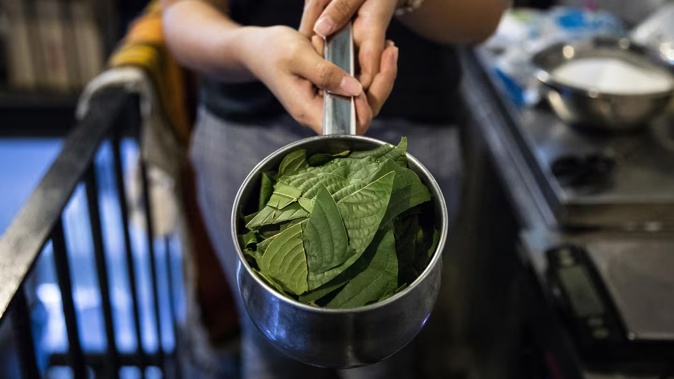
The United States Food and Drug Administration pushed today to restrict a synthetic opioid found in tablets, gummies, and drinkable shots commonly sold in convenience stores.
Health officials announced they will seek to add 7-OH – a potent substance synthesised from a compound in the kratom leaf – to the tier of controlled substances reserved for the most addictive drugs, such as heroin and LSD.
The FDA, researchers, and kratom companies have grown increasingly alarmed by the rise of 7-OH products they say are distinct from all-natural teas and powders derived from a leaf that grows on trees native to Southeast Asia.
FDA Commissioner Marty Makary said at a news conference that the agency is not asking to restrict natural products made from kratom, which contains trace amounts of the compound.
In a report released today, the agency said it maintains concerns about kratom broadly but needed to act urgently on 7-OH because of its risk of sedation, nausea, breathing problems, and addiction.
“We think it’s night and day in terms of the public health risk,” Makary said of 7-OH products.
The agency is recommending to the Drug Enforcement Administration that 7-OH be classified as Schedule I, a tier designated to have no medical value and high risk of abuse.
That tier still includes marijuana, which federal officials under the Biden Administration sought to move to a less restrictive category. That issue remains undecided.
The law enforcement agency will review the 7-OH recommendation “expeditiously”, DEA Deputy Assistant Administrator Thomas Prevoznik said.
Federal health officials rolled out the campaign to stamp out 7-OH with the nation still in the throes of a drug crisis fuelled by illicit fentanyl, methamphetamine, and other synthetic compounds easily manufactured in clandestine labs.
Overdose deaths have dropped dramatically during the past year but still topped a staggering 80,000 in 2024.
Health and Human Services Secretary Robert F. Kennedy jnr, who himself battled a heroin addiction decades ago, said that public health agencies have been “asleep at the wheel” on previous crises of addiction in the US.
The FDA’s report presented scientific studies on 7-OH and advisories to consumers and doctors warning them of “eye-catching” products sold as gummies, candies, and even ice-cream cones meant to appeal to young people.
This month, the FDA said it had sent warning letters to seven companies regarding allegations that they illegally marketed 7-OH products as dietary supplements or unapproved drugs that touted relief from pain or anxiety.
The scrutiny of 7-OH products adds another twist to the saga of kratom in the US.
Amid the nation’s drug crisis, kratom has become increasingly popular as users seek alternatives for pain or relief from opioid withdrawal symptoms.
Smoke shops, service stations, convenience stores and online retailers across the US sell to devoted users who champion the health benefits of all-natural kratom products on social media.
Speaking at the news conference today, kratom advocate Melody Woolf drew a distinction between the powdered kratom leaf she takes to ease her chronic pain and 7-OH products.
Woolf said: “7-OH is not what helped me get out of bed and get the quality of life I enjoy”.
Kratom acts as a mild stimulant when taken in small doses. Experts say that in higher doses, kratom’s compounds can induce euphoria similar to opioids, though with less potency than many legal painkillers.
One of kratom’s many natural compounds is converted into the metabolite 7-OH, or 7-hydroxymitragynine, which produces an opioid-like effect in the brain.
Though kratom contains trace amounts of the compound naturally, companies use semisynthetic 7-OH extracts to make an entirely new and potent product, said Christopher McCurdy, professor of medicinal chemistry at the University of Florida College of Pharmacy.
“This is essentially putting legal morphine at the gas station,” McCurdy said.
Retailers have been slapped with wrongful-death lawsuits from families of people who died with kratom compounds in their blood, usually in conjunction with illicit drugs.
In 2016, the Drug Enforcement Administration announced plans to classify kratom compounds as controlled substances but shelved the idea after a fierce backlash.
More than a dozen states have passed laws regulating kratom, according to the American Kratom Association, a trade group representing the industry.
The association casts companies selling “enhanced” 7-OH products as bad actors that offer “chemically manipulated” products – usually concentrated shots and tablets.
The products distort the public’s understanding of kratom and provide ammunition to critics who seek to ban plant products, said Mac Haddow, a spokesman and lobbyist for the association.
“We do not believe these products should be available over the counter,” Haddow said in an interview yesterday.
An opposing trade association, the Holistic Alternative Recovery Trust, said the criticism is part of an “intra-industry turf war” between companies losing market share and those making better products.
“Consumers find it more effective and safer,” Jeff Smith, the group’s national policy director, said of such 7-OH products.
Smith said the group supports measures such as warning labels, age restrictions and testing by third-party independent labs.
But he criticised the FDA’s proposals, saying officials presented no science to support the alleged dangers of 7-OH. He predicted a ban would push users to return to more dangerous substances and destroy responsible businesses.
“The public needs to speak up to prevent dramatic regulatory over-reach,” Smith said.
Take your Radio, Podcasts and Music with you









